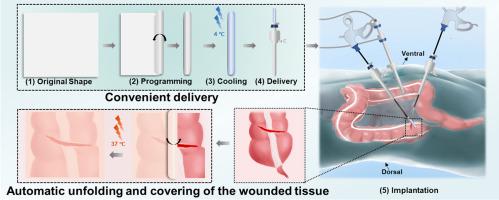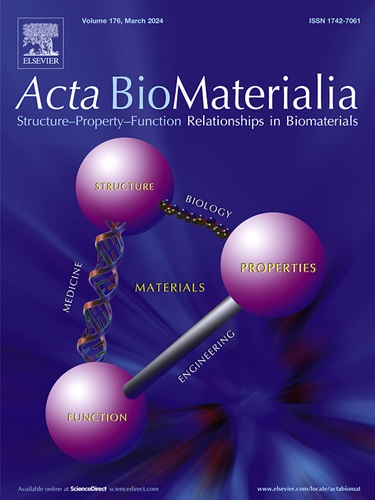A biodegradable shape memory polyurethane film as a postoperative anti-adhesion barrier for minimally invasive surgery
IF 9.4
1区 医学
Q1 ENGINEERING, BIOMEDICAL
引用次数: 0
Abstract
Postoperative adhesions commonly form in various tissues, resulting in serious implications and an increased risk of secondary surgery. The application of anti-adhesion films as physical barriers has proven effective in reducing adhesion incidence and severity. However, existing anti-adhesion films require manual deployment during minimally invasive surgery, posing inconvenience and possibility of further injury. To address these limitations, we have developed an intelligent anti-adhesion film based on shape memory polyurethane. In this work, a linear shape memory polyurethane (ISO2-PU), incorporating hexamethylene isocyanate and isosorbitol as hard segments and poly(D, L-lactic acid) macrodiol as soft segments, was fabricated into an anti-adhesion film. The favorable shape memory effect of the ISO2-PU film ensures its convenient delivery and automatic unfolding, as revealed by a simulation experiment for endoscopic surgical implantation. Furthermore, the glass transition temperature (Tg) close to body temperature endows the ISO2-PU film with good mechanical compliance, thus ensuring a reliable fit with the wounded tissue to avoid undesired folding. Finally, in vivo experiments using a rat cecal abdominal wall injury model demonstrated that the combination of reliable fit, appropriate degradation rate, and good cytocompatibility promises the ISO2-PU film with high anti-adhesion efficacy. This work validates the concept of shape memory anti-adhesion barrier and expands future directions for advanced anti-adhesion biomaterials.
Statement of significance
Postoperative adhesions are a common complication that occurs widely after various surgeries. This work developed an intelligent anti-adhesion film based on a linear shape memory polyurethane (ISO2-PU). This film is featured with remarkable shape memory effect and mechanical compliance at body temperature, appropriate degradability, and good cytocompatibility. These merits ensure convenient delivery and smart unfolding of ISO2-PU film during minimally invasive surgery and favorable postoperative anti-adhesion efficacy. The results validate the concept of shape memory anti-adhesion barrier and paves a way for designing next-generation anti-adhesion biomaterials.

可生物降解的形状记忆聚氨酯薄膜作为微创手术的术后防粘连屏障
术后粘连通常会在各种组织中形成,造成严重影响并增加二次手术的风险。事实证明,使用防粘连薄膜作为物理屏障可有效降低粘连的发生率和严重程度。然而,现有的防粘连薄膜需要在微创手术中手动铺设,造成不便并可能造成进一步伤害。针对这些局限性,我们开发了一种基于形状记忆聚氨酯的智能防粘连薄膜。在这项研究中,我们将线性形状记忆聚氨酯(ISO2-PU)制成了一种防粘连薄膜,该聚氨酯以异氰酸己酯和异山梨醇为硬段,以聚(D,L-乳酸)大二元醇为软段。内窥镜手术植入模拟实验表明,ISO2-PU 薄膜具有良好的形状记忆效应,可确保其方便输送和自动展开。此外,接近体温的玻璃化转变温度(Tg)赋予了 ISO2-PU 薄膜良好的机械顺应性,从而确保了与创伤组织的可靠贴合,避免了不必要的折叠。最后,使用大鼠盲肠腹壁损伤模型进行的活体实验表明,可靠的贴合性、适当的降解率和良好的细胞相容性使 ISO2-PU 薄膜具有很高的抗粘连功效。这项研究验证了形状记忆防粘连屏障的概念,并拓展了先进防粘连生物材料的未来发展方向。意义说明:术后粘连是一种常见的并发症,广泛发生在各种手术之后。这项研究开发了一种基于线性形状记忆聚氨酯(ISO2-PU)的智能防粘连薄膜。该薄膜具有显著的形状记忆效果和体温下的机械顺应性、适当的降解性和良好的细胞相容性。这些优点确保了 ISO2-PU 薄膜在微创手术中的便捷输送和智能展开,以及良好的术后防粘连功效。这些结果验证了形状记忆防粘连屏障的概念,为设计下一代防粘连生物材料铺平了道路。
本文章由计算机程序翻译,如有差异,请以英文原文为准。
求助全文
约1分钟内获得全文
求助全文
来源期刊

Acta Biomaterialia
工程技术-材料科学:生物材料
CiteScore
16.80
自引率
3.10%
发文量
776
审稿时长
30 days
期刊介绍:
Acta Biomaterialia is a monthly peer-reviewed scientific journal published by Elsevier. The journal was established in January 2005. The editor-in-chief is W.R. Wagner (University of Pittsburgh). The journal covers research in biomaterials science, including the interrelationship of biomaterial structure and function from macroscale to nanoscale. Topical coverage includes biomedical and biocompatible materials.
 求助内容:
求助内容: 应助结果提醒方式:
应助结果提醒方式:


